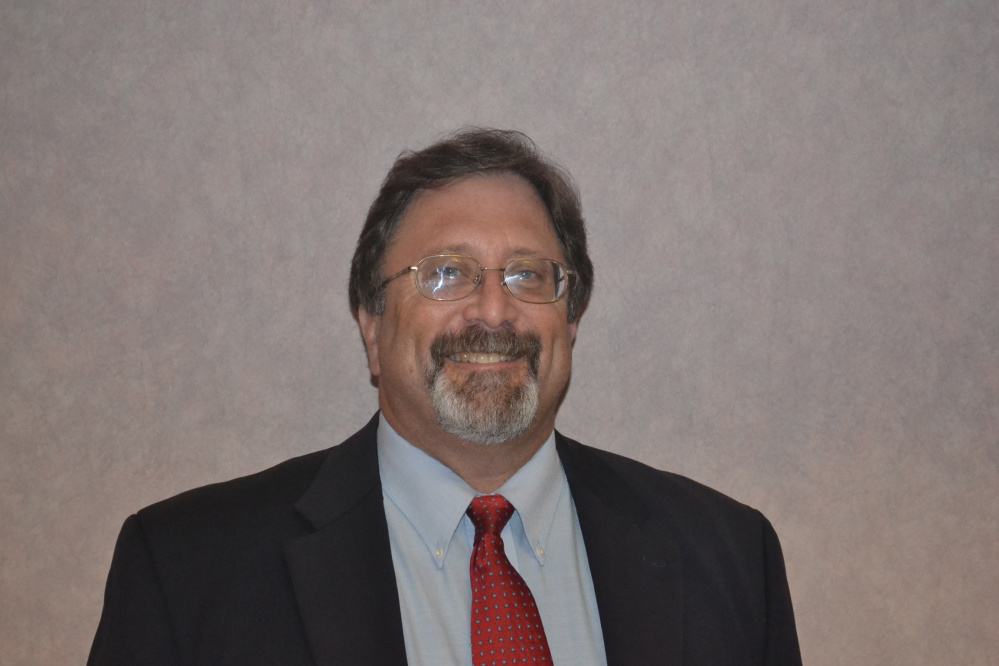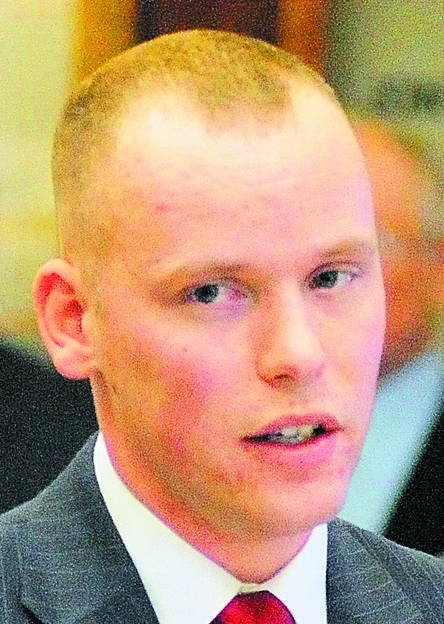AUGUSTA — A veteran former councilor looking to make his return to city politics, a former state representative and a relative political newcomer are in a three-way race for two at-large spots on the Augusta City Council.
Vying to fill two open at-large seats on the council in the Nov. 8 elections are Mark O’Brien, Corey Wilson and Jim Paulette.
O’Brien, 57, an attorney with the United States Small Business Administration, served on the Augusta Board of Education from 1989 to 2000, the last eight years of which he was chairman of the board. He then moved over to city council, where he was an at-large member from 2001 to 2003, the Ward 4 city councilor from 2006 to 2014, and interim mayor in 2014. He believes his experience would be helpful on the council, especially as three current councilors, Patrick Paradis, Cecil Munson and Dale McCormick, are coming off the council.
“I’m running because I want Augusta to be a great, safe place to live, work and play, to start and grow a business, and raise and educate a family,” O’Brien said. “I want to give back to the community that has been good to me.”
Wilson, 31, a manager at VA Maine Healthcare Systems-Togus, represented Augusta in the state House of Representatives from 2012 to 2014. Wilson said he’s a moderate with the ability to work well with others for the common good.
“In order for any good body to function well and make sound decisions, you need people to be consensus builders. That’s a skill set that is needed now more than ever,” he said. “I’m a middle of the road guy with a proven record of doing what is right for the city of Augusta.”
Paulette, 32, a contract specialist with the United States Navy working in Bath, has no prior political experience. He said he’s running to be a voice for the city’s middle class.
“I’ve felt the City Council has been deferential to corporate interests and big business interests, and much of the population of Augusta has been disenfranchised from city politics,” he said. “I’m going to fight tirelessly for the middle class.”
Paulette said current city officials are neglecting what he describes as the heart of the city, the Sand Hill and downtown areas. He agrees with a recent City Council decision to support the restoration of the privately owned Colonial Theatre with $300,000 in city funds to be paid after private funds are raised to pay for the up to $6 million project. He said the theater could be an anchor and economic engine to help revitalize the downtown, but he said the city needs to do more to improve downtown and the Sand Hill area to help drive out crime and address blight.
Wilson agrees the Colonial Theatre could play an important role in helping to revitalize the downtown, and the city should support it, but he declined to commit to a specific level of city funding for the theater without looking at that funding in the context of the rest of the budget and what else is competing for funding. He said the city needs to do everything it can to keep and attract job-creating businesses, including offering them tax incentives, cleaning up and investing in old city infrastructure and offering city-owned property to businesses at reduced rates.
O’Brien said he agrees with the council’s recent decision to commit $300,000 to the Colonial Theatre, because the restored theater could do wonders for the city by bringing culture and people to the downtown. He said the city should pursue public-private partnerships, citing a recent tax increment financing agreement with Augusta printer J.S. McCarthy which was expected to allow the firm to expand and add at least six new jobs as an example of a positive partnership.
ST. MARK’S PROPERTY
All three candidates weighed in on what the city’s role should be in determining the future of the prominent St. Mark’s Church property, a contentious issue involving church officials’ effort to sell the property, which abuts a prominent west side neighborhood. City councilors and neighborhood residents have expressed concern about the property potentially being sold and turned into a homeless shelter or something similar, prompting city councilors to adopt a 180-day moratorium on certain types of development in multiple city zoning districts.
O’Brien said the city’s role should be to look at what its zoning rules allow to take place on the St. Mark’s property. He declined to say what types of uses he thinks would be good for the property, out of concern that he doesn’t want to prejudge the situation should he end up in a position to vote on an issue related to it.
“My inclination would be to let the situation play out against what the zoning allows for there. I think that goes a long way to dictating what uses would be permitted or not in that area,” he said.
Paulette said the St. Mark’s property seems like an excellent location for a homeless shelter and center to provide other assistance to people in need.
“The city had an opportunity to help a lot of people” by allowing St. Mark’s to potentially become a homeless shelter, Paulette said, criticizing the 180-day moratorium. “We need to be a voice, as city councilors, for every segment of society. It’s centrally located, and I think it is an excellent place where a wide range of social services could be offered. It would be a great way for (the property) to be preserved and for a lot of people to be helped.”
Wilson said the city needs to work with all stakeholders to address the St. Mark’s issue and also needs to work to identify a location where social services could best be provided to those in need, whether that is at St. Mark’s or elsewhere. He said senior housing could be a good use for the St. Mark’s property.
“I don’t think there should be anything off the table for options,” Wilson said. “We need to ensure all the stakeholders’ voices are heard, address the concerns of citizens and the west side neighborhood and the concerns of others who may want to use that property, and strike that balance.”
RECYCLING AND TRASH
Neither Wilson nor O’Brien think the city should bring back a curbside recycling program, which city councilors voted to scrap last year due to concerns it was too expensive for the amount of recyclables it collected. The city now has four single-stream recycling drop-off locations where residents can bring their recyclables and regular weekly pick up of non-recyclable trash 52 weeks a year, increased from 40 weeks a year when once-a-month curbside recyclables pickup ended.
O’Brien said the drop-off locations provide a cheaper alternative to curbside recycling, and he’s heard from many residents who appreciate having their regular trash picked up every week.
Wilson said providing curbside recycling, when other, cheaper options for people who wish to recycle still exist with the drop-off locations, isn’t financially prudent and would increase the tax rate.
Paulette said the city should bring back curbside recycling and said if the city is creative, it could do so at a cost much lower than the figures councilors discussed previously. He said he estimates costs as part of his career, and he is good at challenging financial assumptions.
Paulette said people should vote for him to ensure their voice is heard in the political process in Augusta, adding, “A lot of people in this town aren’t doing well. They’re hanging by a thread. I think we can serve our working class and middle class better.”
O’Brien said he has “a unique combination of experience, skills and temperament to have a positive impact on the council. And this year in particular, experience matters when we’re losing so much institutional knowledge on the council.”
Wilson said, “We need somebody who is going to be level-headed, and that’s what I’ve proven I can do.”
Keith Edwards — 621-5647
Twitter: @kedwardskj
Send questions/comments to the editors.






Success. Please wait for the page to reload. If the page does not reload within 5 seconds, please refresh the page.
Enter your email and password to access comments.
Hi, to comment on stories you must . This profile is in addition to your subscription and website login.
Already have a commenting profile? .
Invalid username/password.
Please check your email to confirm and complete your registration.
Only subscribers are eligible to post comments. Please subscribe or login first for digital access. Here’s why.
Use the form below to reset your password. When you've submitted your account email, we will send an email with a reset code.